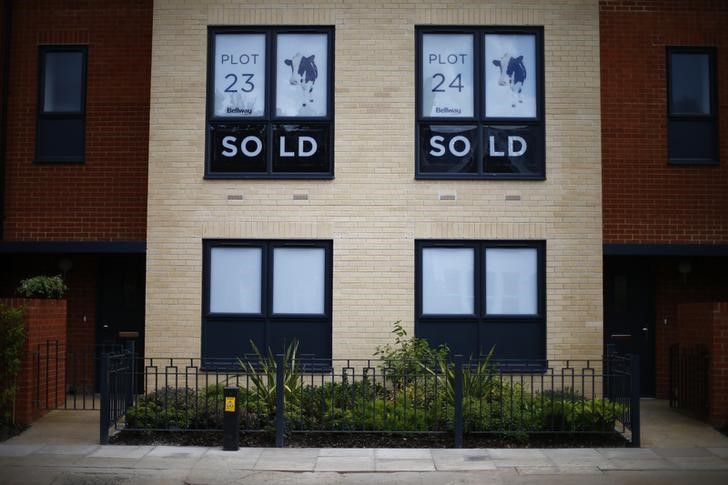By Jonathan Cable
LONDON (Reuters) - British house prices will continue to rise over the next three years as the market is capable of withstanding the gradual interest rate increases expected from the Bank of England, a Reuters poll showed.
Home values will rise 6.0 percent this year, 4.0 percent next and 3.5 percent in 2017, the poll of over 20 analysts taken in the past week found, faster than predicted in a February poll.
"A lack of homes on the market will boost house prices this year, as will the reform to stamp duty implemented at the end of last year," said Matthew Pointon at Capital Economics, referring to the property transaction tax in Britain.
"But with prices already very high in relation to earnings, and with tougher mortgage regulations preventing loan-to-income ratios from rising ever higher, gains in 2016 and 2017 will be far more modest."
Home prices are already expensive relative to fundamentals the poll found. It gave a consensus rating of 6 on a 10-point scale, where one is very undervalued and 10 is very overvalued. In London the median was 9 - and some analysts said 10.
London prices have skyrocketed, often turning in double-digit annual gains and far outpacing the national market, but the poll suggested their rises will be more modest over the coming years and pretty much match the overall pace.
Demand has often outstripped supply in the country, particularly in the capital, and shares in homebuilders Taylor Wimpey (L:TW) and Barratt Developments (L:BDEV) hit near 8-year highs last week.
The dearth of supply means the average asking price for a home was 285,891 pounds ($435,612) in May, according to property website Rightmove, more than ten times the national median annual salary.
That disparity may get worse. Wages are only expected to rise 2.6 percent this year and 3.4 percent next, according to a separate Reuters poll published last month. [ECILT/GB]
BANK RATE BRUSH OFF
The Bank of England has left Bank Rate at a record low 0.5 percent for more than six years, making borrowing costs very cheap for those climbing the housing ladder.
But with rates already so low, most say the only way for them to go is up.
Markets don't expect the first rate rise to come from the Monetary Policy Committee for about a year while a Reuters poll of economists last week suggested the first hike would come in early 2016. [BOE/INT]
What they do both agree on is that when rates do start to rise they will do so only gradually. Last week's poll said Bank Rate would still be at an historically low 2.00 percent at the end of 2017.
Seventeen of 21 respondents were therefore confident the market could withstand that expected path and two were very confident. Only two were not confident and none were not at all confident.
"Rates are hardly expected to rise much at all and not for some time yet. Hence the housing market can definitely withstand that degree of tightening," said Alan Clarke at Scotiabank.
Mortgage approvals jumped by the most in more than six years in April, the BoE said on Tuesday, as borrowers took advantage of the low repayments. This gave another sign of a bounce-back in Britain's housing market.
The country's economic recovery has relied largely on spending by households and 14 of 22 poll participants said the economy remained sensitive to housing market activity. Two said it was very sensitive and six not sensitive.
"The economy is sensitive. Much discretionary consumer spending is linked to turnover in the housing market, while rising house prices, on balance, boost consumer confidence," said Stephen Lewis at ADM ISI.
($1 = 0.6563 pounds)

(Polling by Sarmista Sen and Krishna Eluri; editing by Ralph Boulton)